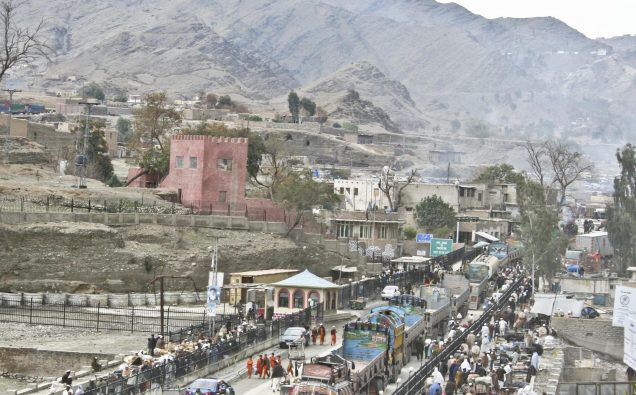
Torkham Gate on Pakistan-Afghanistan border Photo by Staff Sgt. Ryan Matson (U.S. Armed Forces) via Wikimedia Commons
Pakistan is moving fiercely against militant hideouts both in its mainland and along the Afghan border after a week of deadly bombing claimed by Jamaat ul Ahrar and ISIS with reported sanctuaries in Afghanistan.
The actions come after suicide bombers kill police officers and civilians in Lahore, targetted bomb disposal experts in Quetta and then carried out carnage in a famous Sufi shrine in Sehwan, Sindh. Peshawar and tribal areas were also targeted by militants.
Islamabad has also closed the long porous border with Afghanistan and the Torkham Gate – one of the busiest points of transportation between the two countries. Pakistani authorities have also asked Afghan refugees to cooperate with the government in identifying black sheep – militants – who many be hiding among refugees. Pakistan has been hosting more than two million Afghan refugees for decades since 1908s Soviet occupation of Afghanistan.
The combined death toll from this week’s attacks has reached 125 including more than 80 killed on the compound of Lal Shahbaz Qalandar’s shrine where devotees were whirling in Dhamal, a form of ecstatic devotional dance.
On Friday, reports said Pakistan eliminated around 100 militants through intelligence based operations.
Chief Minister Punjab Shahbaz Sharif also claimed to have busted the network and handlers of attack in Lahore. Dawn newspaper published a picture of the suspected handler of Afghan suicide bombers, who attacked Lahore, killing 13 persons. The newspaper said the name of the handler is Anwar ul Haq.
Jamaat ul Ahrar is a splinter group of Tehreek e Taliban Pakistan (TTP), which was inflicted severe blows in a major Pakistani operations two years ago but many of its militant commanders fled into Afghanistan. The ISIS has long been operating in Afghanistan. On Friday, Pakistan’s new army chief General Qamar Javed Bajwa talked to US top military commander in Afghanistan General John Nicholson and conveyed Pakistan’s concerns over the continued acts of terrorism in Pakistan with impunity from Afghanistan.
“Such terrorist activities and inaction against them are testing our current policy of cross-border restraint,” Bajwa said, according to a statement.
Pakistani civilian and military leaders have asked Kabul to destroy militant sanctuaries or hand over 76 terrorists about which Islamabad has already shared intelligence with the Afghan government.













